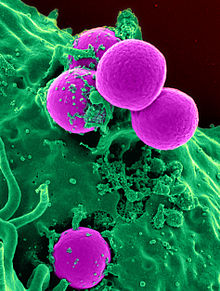Methicillin-resistant S. aureus
| Methicillin-resistant Staphylococcus aureus | |
|---|---|
 |
|
| Scanning electron micrograph of a human neutrophil ingesting MRSA | |
| Scientific classification | |
| Domain: | Bacteria |
| Kingdom: | Eubacteria |
| Phylum: | Firmicutes |
| Class: | Bacilli |
| Order: | Bacillales |
| Family: | Staphylococcaceae |
| Genus: | Staphylococcus |
| Species: | S. aureus |
| Binomial name | |
|
Staphylococcus aureus |
|
Methicillin-resistant Staphylococcus aureus (MRSA) (/ɛmɑːrɛseɪ/ or /ˈmɜːrsə/) is a bacterium responsible for several difficult-to-treat infections in humans. MRSA is any strain of Staphylococcus aureus that has developed, through horizontal gene transfer and natural selection, multi- resistance to beta-lactam antibiotics, which include the penicillins (methicillin, dicloxacillin, nafcillin, oxacillin, etc.) and the cephalosporins. MRSA evolved from horizontal gene transfer of the mecA gene to at least five distinct S. aureus lineages. Strains unable to resist these antibiotics are classified as methicillin-susceptible Staphylococcus aureus, or MSSA. The evolution of such resistance does not cause the organism to be more intrinsically virulent than strains of S. aureus that have no antibiotic resistance, but resistance does make MRSA infection more difficult to treat with standard types of antibiotics and thus more dangerous.
...
Wikipedia
